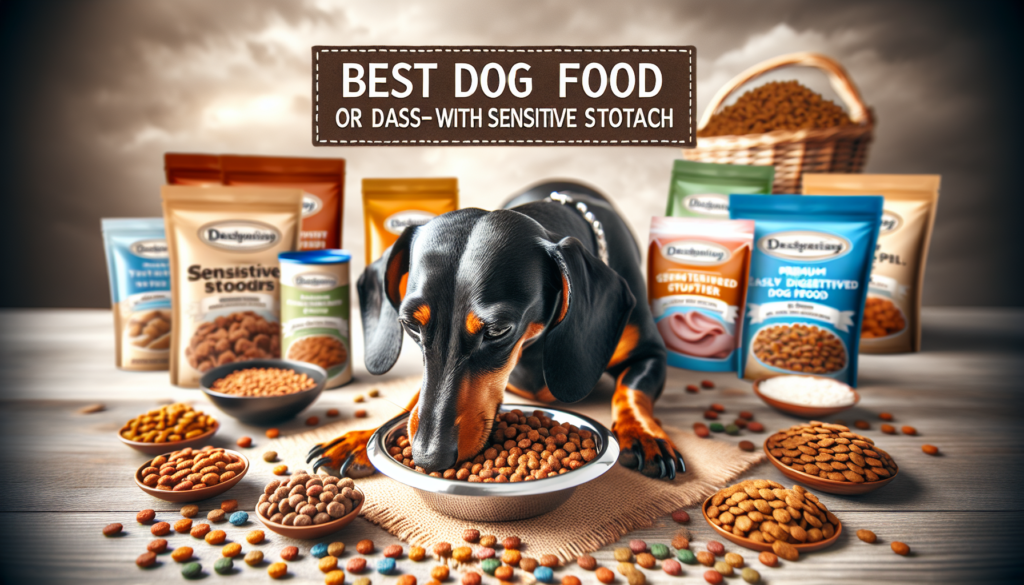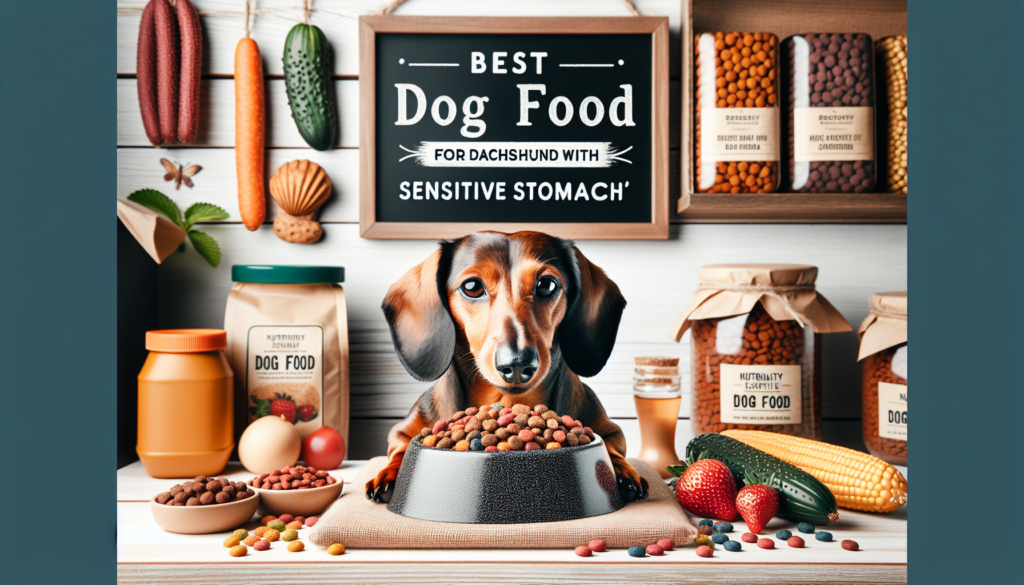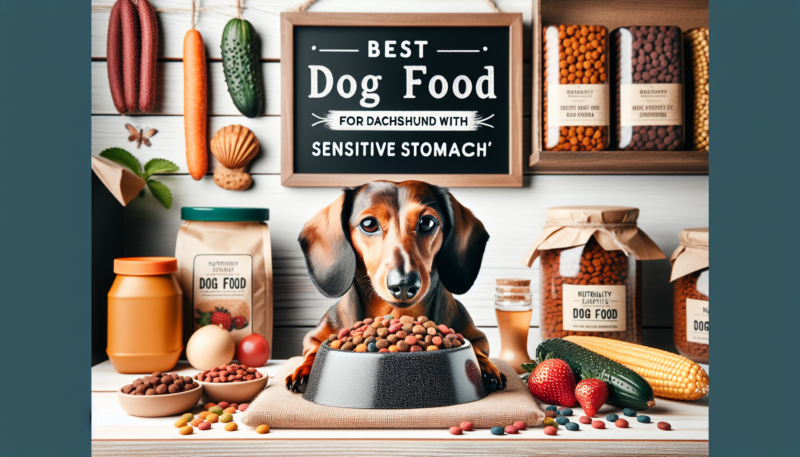Are you a dachshund owner who is constantly worried about your furry friend’s sensitive stomach? Well, fret no more! In this article, we will delve into the world of dachshunds with sensitive stomachs and help you find the best dog food to keep them happy and healthy. From understanding the unique needs of this adorable breed to recommending top-notch dog food options, we’ve got you covered. So, sit back, relax, and let’s explore the wonderful world of dachshund nutrition together!

Causes of sensitive stomach in Dachshunds
Dachshunds, like any other breed of dog, can develop a sensitive stomach. Several factors can contribute to this condition. The most common causes include food allergies, intolerance to certain ingredients, and gastrointestinal disorders.
Food allergies
Food allergies occur when a dog’s immune system reacts negatively to certain ingredients in their diet. In Dachshunds, common allergens include beef, chicken, dairy products, and grains. Allergic reactions can cause symptoms such as vomiting, diarrhea, and skin irritations. Identifying and avoiding these allergens is essential for managing a sensitive stomach in your Dachshund.
Intolerance to certain ingredients
Dachshunds may also develop an intolerance to specific ingredients in their food. While different from allergies, intolerances can still cause digestive issues. Common intolerances in Dachshunds include lactose intolerance and sensitivities to certain carbohydrates. It’s important to pay attention to the ingredients in your dog’s food and make necessary adjustments if intolerances are suspected.
Gastrointestinal disorders
Gastrointestinal disorders refer to various conditions that can affect the digestive system of Dachshunds. These disorders can disrupt the normal functioning of the stomach and intestines, leading to digestive disturbances. Some common gastrointestinal disorders in Dachshunds include pancreatitis, inflammatory bowel disease, gastroesophageal reflux disease, and hypothyroidism. These conditions require special attention and may need to be managed with the help of a veterinarian.
Identifying the signs of a sensitive stomach in your Dachshund
Recognizing the signs of a sensitive stomach in your Dachshund is crucial for proper diagnosis and treatment. Although each dog may present different symptoms, there are some common indicators to watch out for:
Vomiting
Frequent episodes of vomiting, especially after meals, can indicate a sensitive stomach in your Dachshund. If your dog consistently regurgitates food or experiences chronic vomiting, it’s important to consult with a veterinarian.
Diarrhea
Diarrhea is another common sign of a sensitive stomach. If your Dachshund has loose, watery stools or experiences frequent bowel movements, it may indicate an issue with their gastrointestinal system.
Flatulence
Excessive flatulence, or gas, can be a sign of a sensitive stomach. If your Dachshund frequently passes gas or has a persistent foul smell, it’s worth considering dietary adjustments to alleviate the symptoms.
Constipation
On the other hand, constipation can also indicate digestive issues. If your Dachshund has difficulty passing stools or has irregular bowel movements, it may be a sign of a sensitive stomach.
Lack of appetite
A decreased appetite or reluctance to eat can be an indication of a sensitive stomach in Dachshunds. If your dog consistently refuses meals or shows disinterest in food, it’s essential to investigate the underlying cause.
Weight loss
Unexplained weight loss associated with a sensitive stomach can be concerning. If your Dachshund is losing weight without any apparent reason, it’s important to seek veterinary advice to determine the cause and implement appropriate dietary changes.
Importance of a balanced diet for Dachshunds with sensitive stomachs
Maintaining a balanced diet is of utmost importance for Dachshunds with sensitive stomachs. A balanced diet helps promote optimal digestion, supports gut health, and provides essential nutrients for overall wellbeing.
Promotes optimal digestion
A balanced diet ensures that your Dachshund’s digestive system receives the necessary nutrients to function properly. It helps regulate bowel movements, aids in nutrient absorption, and reduces the risk of digestive disturbances.
Supports gut health
A healthy gut is essential for maintaining a strong immune system and preventing gastrointestinal disorders. A balanced diet for Dachshunds with sensitive stomachs should include ingredients that promote a healthy gut flora, such as prebiotics and probiotics.
Provides essential nutrients
Dachshunds with sensitive stomachs may have difficulty absorbing nutrients from their food. A balanced diet ensures that they receive all the essential nutrients, including proteins, carbohydrates, fats, vitamins, and minerals, to support their overall health and wellbeing.
Choosing the right dog food for Dachshunds with sensitive stomachs
When it comes to selecting the right dog food for Dachshunds with sensitive stomachs, there are a few factors to consider. The following options can help alleviate digestive issues and promote optimal digestion:
Limited ingredient diets (LID)
Limited ingredient diets focus on a simplified ingredient list to minimize the risk of triggering food allergies or intolerances. These diets usually contain a single source of animal protein and limited carbohydrate options, making it easier to identify and avoid potential allergens or irritants.
Grain-free formulas
Some Dachshunds with sensitive stomachs may benefit from grain-free formulas. These diets exclude ingredients like wheat, corn, and soy, which can be challenging to digest for some dogs. Grain-free formulas often use alternative carbohydrate sources, such as sweet potatoes or peas.
Novel protein sources
Introducing novel protein sources can help minimize the risk of allergic reactions in Dachshunds with sensitive stomachs. Examples of novel protein sources include venison, duck, or fish, which may be less likely to trigger allergies compared to common sources like chicken or beef.
Alternative carbohydrate sources
Certain carbohydrates, such as grains, may be difficult for Dachshunds with sensitive stomachs to digest. Opting for dog foods that use alternative carbohydrate sources like sweet potatoes, lentils, or tapioca can be beneficial in reducing digestive disturbances.

Specific ingredients to look for in dog food for Dachshunds with sensitive stomachs
When selecting dog food for Dachshunds with sensitive stomachs, it’s important to look for specific ingredients that support digestion and overall gastrointestinal health. Consider the following ingredients:
High-quality animal protein
Choosing dog foods that contain high-quality animal protein, such as chicken, turkey, or fish, can help support healthy digestion. Animal proteins are easier for dogs to digest compared to plant-based proteins.
Easily digestible carbohydrates
Opt for dog foods that include easily digestible carbohydrates, such as sweet potatoes, brown rice, or oats. These carbohydrates provide energy without putting a strain on your Dachshund’s digestive system.
Healthy fats
Including healthy fats in your Dachshund’s diet can help support their sensitive stomach. Look for dog foods that contain sources of omega-3 fatty acids, such as fish oil or flaxseed, which can reduce inflammation and promote optimal digestion.
Prebiotics and probiotics
Prebiotics and probiotics are beneficial for maintaining a healthy gut flora. Look for dog foods that include ingredients like chicory root or inulin, which serve as prebiotics, as well as probiotic strains like Lactobacillus or Bifidobacterium.
Omega-3 fatty acids
Omega-3 fatty acids, commonly found in fish oil, can help reduce inflammation in the gastrointestinal tract and support overall digestive health. Look for dog foods that include sources of omega-3 fatty acids to benefit your Dachshund’s sensitive stomach.
Dog food brands recommended for Dachshunds with sensitive stomachs
While individual Dachshunds may have different dietary needs, several dog food brands are often recommended for dogs with sensitive stomachs. Consider trying the following brands:
Brand A
Known for their limited ingredient diets and grain-free formulas, Brand A offers a variety of options suitable for Dachshunds with sensitive stomachs. Their focus on high-quality ingredients and careful formulation can help alleviate digestive issues.
Brand B
Brand B has a range of novel protein sources and alternative carbohydrate options, making them a suitable choice for Dachshunds with sensitivities. Their commitment to providing balanced and nutritious meals can support your dog’s overall health.
Brand C
Brand C specializes in providing dog food that supports gut health. Their inclusion of prebiotics, probiotics, and easily digestible ingredients can be beneficial for Dachshunds with sensitive stomachs.
Transitioning your Dachshund to a new dog food
When introducing a new dog food to your Dachshund, it’s essential to do so gradually to minimize the risk of digestive upset. Follow these steps for a smooth transition:
Gradual transition
Start by mixing a small amount of the new dog food with your Dachshund’s current food. Gradually increase the proportion of the new food over a period of 7-10 days. This slow transition allows your Dachshund’s digestive system to adjust to the new diet without causing any sudden disruptions.
Monitor for any adverse reactions
During the transition period, closely observe your Dachshund for any adverse reactions or changes in their digestive health. If you notice any unusual symptoms such as increased vomiting, diarrhea, or loss of appetite, consult your veterinarian for guidance.
Special considerations for Dachshunds with certain gastrointestinal disorders
Dachshunds with specific gastrointestinal disorders may require additional dietary considerations. Some conditions to be aware of include:
Pancreatitis
Dachshunds with pancreatitis may benefit from a low-fat diet. These dogs may require a specialized prescription diet formulated specifically for pancreatitis management. Consult with your veterinarian to determine the best dietary approach for your Dachshund.
Inflammatory bowel disease
Dachshunds with inflammatory bowel disease may require a hypoallergenic or novel protein diet. These diets minimize the risk of triggering allergic reactions or further inflammation in the gastrointestinal tract.
Gastroesophageal reflux disease
Dogs with gastroesophageal reflux disease may benefit from smaller, more frequent meals and elevated feeding stations. Avoiding ingredients that may exacerbate acid reflux, such as spicy foods or fatty meals, can also be beneficial.
Hypothyroidism
Dachshunds with hypothyroidism may require a diet specifically formulated for dogs with thyroid issues. These diets typically include controlled levels of fat and specific nutrients to support thyroid function.
Consultation with a veterinarian is crucial for Dachshunds diagnosed with any of these conditions. They can provide appropriate guidance and recommend the most suitable dietary options.
Homemade dog food recipes for Dachshunds with sensitive stomachs
If you prefer to prepare homemade meals for your Dachshund with a sensitive stomach, consider these recipes:
Recipe A
- Cooked, lean ground turkey
- Steamed carrots
- Mashed sweet potatoes
- Cooked brown rice
Combine all ingredients in appropriate proportions and mix well. Serve in appropriate meal-sized portions for your Dachshund.
Recipe B
- Baked salmon
- Sautéed green beans
- Quinoa
Cook the ingredients separately and combine in appropriate proportions. Serve in suitable meal-sized portions.
Recipe C
- Boiled chicken breast
- Cooked peas
- White potatoes
Boil the chicken breast, cook the peas and potatoes separately, then combine in appropriate proportions. Serve in suitable meal-sized portions.
When preparing homemade meals, it’s essential to consult with a veterinarian or veterinary nutritionist to ensure the recipes meet your Dachshund’s dietary needs.
Conclusion
Having a Dachshund with a sensitive stomach can be challenging, but with the right diet and care, you can help alleviate their digestive issues. Identifying the causes and signs of a sensitive stomach, choosing appropriate dog food, and making necessary dietary adjustments are crucial steps in keeping your Dachshund healthy and happy. Whether you opt for commercial dog food or homemade recipes, always consult with a veterinarian to ensure you’re providing the best possible care for your furry friend.
